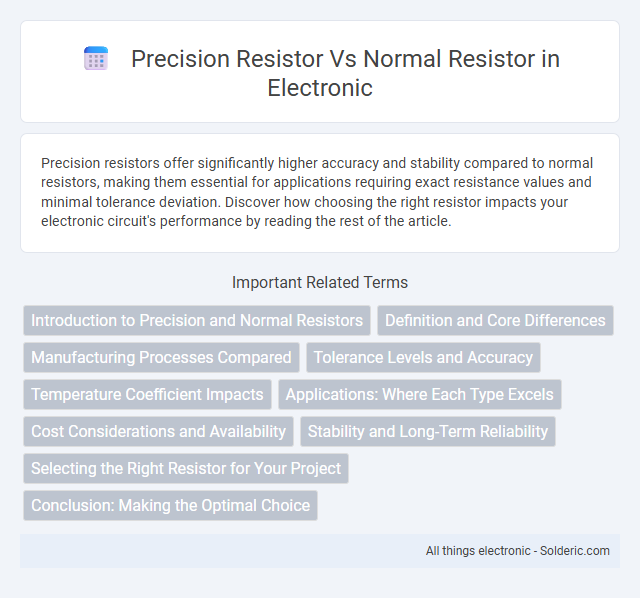Precision resistors offer significantly higher accuracy and stability compared to normal resistors, making them essential for applications requiring exact resistance values and minimal tolerance deviation. Discover how choosing the right resistor impacts your electronic circuit's performance by reading the rest of the article.
Comparison Table
| Feature | Precision Resistor | Normal Resistor |
|---|---|---|
| Tolerance | +-0.01% to +-1% | +-5% to +-20% |
| Accuracy | High accuracy with stable resistance | Lower accuracy, variable resistance |
| Temperature Coefficient | Low TCR (ppm/degC), typically 5-50 ppm/degC | Higher TCR, often >100 ppm/degC |
| Applications | Calibration, measurement instruments, precision circuits | General-purpose electronics, consumer devices |
| Cost | Higher price due to manufacturing precision | Lower cost, mass-produced |
| Stability | High long-term stability | Lower long-term stability |
Introduction to Precision and Normal Resistors
Precision resistors offer highly accurate resistance values with tolerances typically less than 1%, ensuring minimal deviation from specified ratings, whereas normal resistors generally have wider tolerances around 5% or more. These precision components maintain stability under varying temperature and environmental conditions, critical for applications demanding exact measurements and consistent performance. Your choice between precision and normal resistors depends on the required accuracy and reliability for the specific electronic circuit or device.
Definition and Core Differences
Precision resistors provide highly accurate resistance values with tight tolerance levels, typically within +-0.1% to +-0.01%, unlike normal resistors which commonly have tolerances of +-5% or +-10%. These resistors maintain stability under varying temperature and environmental conditions due to specialized materials and manufacturing processes. Core differences include improved long-term stability, lower temperature coefficients, and reduced noise, making precision resistors ideal for critical applications requiring exact current control and signal accuracy.
Manufacturing Processes Compared
Precision resistors undergo meticulous manufacturing processes including advanced thin-film deposition and laser trimming to achieve tight tolerance levels typically within +-0.1% or better. Normal resistors often use thicker, less controlled carbon or metal oxide films with tolerances ranging from +-5% to +-20%. Enhanced process controls and superior materials in precision resistor fabrication result in stable resistance values and minimal temperature coefficients, setting them apart from standard resistors.
Tolerance Levels and Accuracy
Precision resistors offer significantly tighter tolerance levels, typically ranging from +-0.01% to +-0.1%, compared to normal resistors which usually have tolerances of +-1% to +-5%. This enhanced accuracy ensures that precision resistors provide consistent resistance values critical for sensitive electronic circuits and measurement devices. Choosing precision resistors allows you to achieve exact performance specifications and maintain reliable circuit operation under varying environmental conditions.
Temperature Coefficient Impacts
Precision resistors have a significantly lower temperature coefficient, often as low as +-5 ppm/degC, compared to normal resistors which typically range around +-100 ppm/degC or more. This reduced temperature coefficient minimizes resistance changes with temperature fluctuations, ensuring more stable and accurate performance in sensitive circuits. Your applications demanding consistent resistance and minimal drift benefit greatly from the superior thermal stability of precision resistors.
Applications: Where Each Type Excels
Precision resistors excel in applications requiring extremely accurate and stable resistance values, such as in medical devices, instrumentation, and aerospace systems, where even minute resistance changes can impact performance. Normal resistors are typically used in general-purpose electronics like consumer gadgets, power supplies, and signal processing circuits, where tolerance and stability requirements are less stringent. Your choice depends on whether your project demands high precision and long-term reliability or cost-effective, standard resistance solutions.
Cost Considerations and Availability
Precision resistors typically cost more than normal resistors due to tighter manufacturing tolerances and higher quality materials, which ensure greater accuracy and stability. While normal resistors are widely available and suitable for general applications, precision resistors may require longer lead times and are less common in standard inventory. Your choice should balance cost constraints with the necessity for exact resistance values in your project.
Stability and Long-Term Reliability
Precision resistors exhibit superior stability and long-term reliability compared to normal resistors due to their tight tolerance values, typically within +-0.1% or better, which ensures minimal resistance drift over time and temperature variations. These resistors utilize high-quality materials and advanced manufacturing processes to maintain consistent performance in demanding applications such as instrumentation and aerospace. Normal resistors, often rated with tolerance of +-5% or +-10%, experience greater variations in resistance under environmental stress, leading to less predictable circuit behavior and reduced lifespan.
Selecting the Right Resistor for Your Project
Selecting the right resistor for your project requires understanding the key differences between precision resistors and normal resistors, with precision resistors offering tighter tolerance levels often under +-1%, ensuring more accurate and reliable circuit performance. Normal resistors typically have wider tolerance ranges, such as +-5% or +-10%, making them suitable for general applications where exact resistance values are less critical. Choosing precision resistors is essential in sensitive electronics, measurement devices, and calibration circuits that demand high stability and minimal variance over temperature and time.
Conclusion: Making the Optimal Choice
Precision resistors offer superior tolerance levels, typically +-0.1% or better, ensuring highly accurate and stable resistance values essential for sensitive electronic circuits. Normal resistors, with tolerances around +-5%, are suitable for general-purpose applications where exact precision is less critical. Choosing between precision and normal resistors depends on the specific application requirements for accuracy, stability, and cost-efficiency.
precision resistor vs normal resistor Infographic

 solderic.com
solderic.com